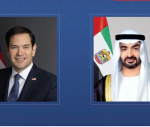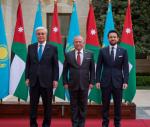You are here
Iraq cries out for unity
Dec 21,2019 - Last updated at Dec 21,2019
MADRID — With popular discontent erupting in numerous countries around the world, the mass demonstrations in Iraq that have triggered the fall of the country’s government have gone relatively unnoticed in the West. Although the violence perpetrated by the Iraqi security forces is estimated to have caused the deaths of around 500 people, the country’s upheavals over the last few decades have been so persistent that many Westerners seem to have become desensitised to them. And that is not the only uncomfortable reality: Unlike in Venezuela or Hong Kong, popular indignation in Iraq is directed toward a Western-sponsored regime.
Following the territorial defeat of the Daesh terror group, Iraq returned more or less to the previous status quo, although the effects of the Salafist insurgency remain visible. Iraq has undergone a bittersweet recovery, because the flagrant defects of the country’s political system have not yet been corrected. Rather than aspire to develop a greater sense of cohesion, the 2005 constitution — supported by the United States — established a system of power-sharing based on ethnic and religious criteria. So instead of nurturing democracy, the current constitution fed the spiral of sectarianism that was already tearing the country apart and that ultimately led to the emergence of Daesh.
It would be simplistic to attribute all of Iraq’s troubles to the 2003 US-led invasion and the endless errors that accompanied it. But the US strategy of regime change in Iraq was itself extremely simplistic, ignoring as it did that the record of such policies is filled with failures.
Whatever the primary motivation of President George W. Bush’s administration may have been, the US evidently became obsessed with a forcible military intervention that rejected the most basic diplomatic principles. The problem was not that the Iraqis only understood the language of force, as some self-interested voices have suggested, but that the US government didn’t try hard enough to understand the Iraqis. Nor did the failure of the US operation prove that democracy can’t take root in Iraq. Above all, it would be wise to avoid interpretations based on stigmatisation and rooted in cultural determinism. What has been convincingly demonstrated, though, is that America’s eagerness to mould Iraq overnight according to its wishes was utterly utopian.
The current disorder in Iraq, where pluralism amounts to patronage, is only a part of the desolate sociopolitical panorama to which its citizens are exposed. Iraq’s grave institutional deficiencies go hand in hand with a widespread feeling of humiliation brought on by the country’s subjugation to the will of foreign powers. The US is the most obvious example, but by no means the only one. In fact, the Iraq war also had dreadful geostrategic consequences for America, because it opened the doors wide to Iranian influence.
Hundreds of recently leaked Iranian intelligence cables appear to confirm the enormous extent of this influence, which is most conspicuous in the appointment of Iraq’s prime minister. According to an informally implemented quota system, the office of prime minister must be occupied by a Shiite (the majority religious group in Iraq), which until now has made the choice of premier conditional on Iran’s approval. Yet, the evolution of this dynamic highlights a double paradox: American excesses after 2003 gave Iran its current political clout in Iraq; but Iran failed to learn the lesson, and now itself is facing the consequences of having gone too far.
With their sustained mass protests, Iraqis are saying: “Enough is enough.” The recent resignation of prime minister Adel Abdul Mahdi did not appease the demonstrators, who are calling for an overhaul of the entire political system and an end to foreign interference. It is telling that the Shiite — with the approval of their spiritual leader, Grand Ayatollah Ali Sistani — have been leading the protests, which have included shocking episodes such as the burning of the Iranian consulate in the southern city of Najaf. According to one recent survey, only 1 per cent of the demonstrators trust Iran, 7 per cent trust the US, while 60 per cent trust Sistani.
Although the protests have not spread to regions with a Sunni majority (including Kurdish areas), many members of these communities have supported the protest clamour. This may well lead to yet another paradox, whereby the power-sharing system that has fuelled so much division in Iraq ends up uniting the country’s citizens, if only in their opposition to it. Moreover, this interesting turn of events calls into question the culturalist paradigms that have dominated so many analyses of Iraq and the rest of the region.
The protests in Iraq highlight the fact that the impulses with the greatest transformative potential always arise from within societies. The best approach that the West could take would be to endorse the spirit of such popular movements, but without meddling excessively. The US, moreover, should take note of its past mistakes, and stop pursuing regime change once and for all, whether through military interventions or economic pressure.
Neither Iraq nor Iran, nor any other country, will change for the better as a result of coercion. Rather, improvement will come only through unifying, homegrown projects that offer genuine hope to the majority of society.
Javier Solana, a former EU high representative for foreign affairs and security policy, secretary general of NATO, and foreign minister of Spain, is currently president of the Esade Centre for Global Economy and Geopolitics and distinguished fellow at the Brookings Institution. ©Project Syndicate, 2019.
www.project-syndicate.org

- Popular
- Rated
- Commented
Feb 19, 2025
Feb 18, 2025
Newsletter
Get top stories and blog posts emailed to you each day.











